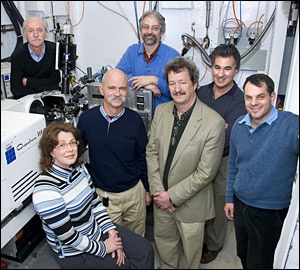The U.S. Department of Energy's (DOE) Brookhaven National Laboratory received grants from DOE and the National Institutes of Health (NIH) totaling $28 million to support an X-ray Crystallography Research Resource at the Laboratory's National Synchrotron Light Source (NSLS). The grants of $15 million from DOE's Office of Biological and Environmental Research and $13 million from NIH's National Center for Research Resources will fund five years of operations and research.
 Some of the members of Brookhaven Lab's X-ray Crystallography Research Resource team are: (back row, from left) Dieter Schneider, Allen Orville, Lonny Berman and (front row, from left) Annie Héroux, Robert Sweet, Howard Robinson and Alexi Soares.
Some of the members of Brookhaven Lab's X-ray Crystallography Research Resource team are: (back row, from left) Dieter Schneider, Allen Orville, Lonny Berman and (front row, from left) Annie Héroux, Robert Sweet, Howard Robinson and Alexi Soares.
One of the world's most widely used scientific facilities, the NSLS provides intense beams of infrared, ultraviolet, and x-ray light to study materials as diverse as computer chips and viruses at the atomic level. X-ray crystallography at the NSLS involves experiments that reveal the 3-D atomic-level structure of large molecules, such as enzymes and nucleic acids, that are found in all living cells. X-ray crystallographers working at the NSLS determined the structures of numerous molecules, including those from organisms responsible for the common cold, Lyme disease, and AIDS. Knowing the structure of a molecule provides information about its function, which, in turn, may lead to important clues about how to create effective drugs to prevent or treat a disease.
“During the last year, 150 university, industrial and national laboratory research groups made a total of 800 visits to work at this resource,” said Brookhaven's Robert Sweet, the principal investigator of the X-ray Crystallography Research Resource, which has a staff of 20. “Their experimental results provide crucial information that may lead to treatments for many health problems, including cancer, infections, and obesity.”
One of the guest investigators who did research at the crystallography resource – Roderick MacKinnon of Rockefeller University – won the 2003 Nobel Prize in Chemistry for investigating the molecular details of nerve transmission. While much of the research at the facility is basic science that may lead to major discoveries, other work is targeted toward achieving a specific, practical goal. For example, about five percent of the research is done by pharmaceutical firms with the goal of finding drugs to treat human disease.